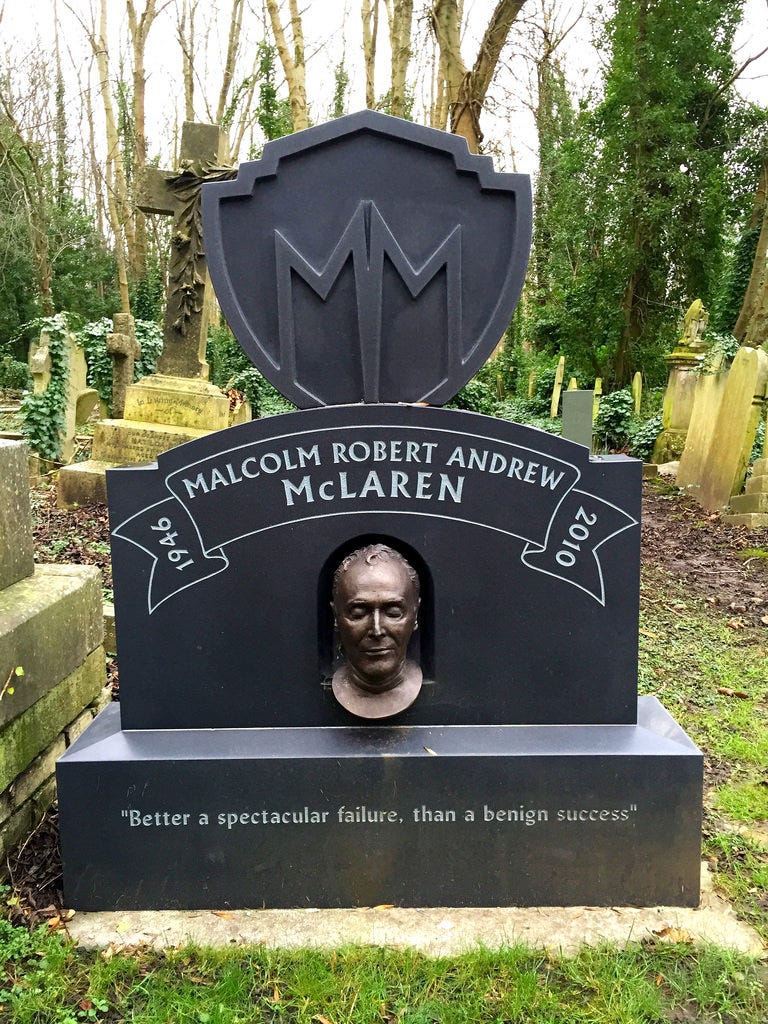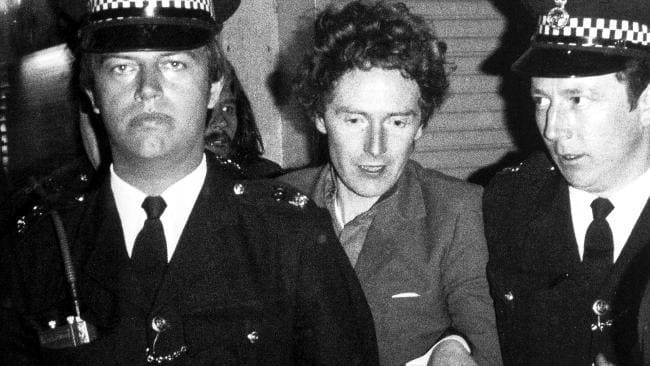Hunting the Famous
“Malcolm McLaren is dead. Cancer.”
The mother of my children relayed the news in 2010. We were lounging in the muggy heat by a Phnom Penh pool. We were behind 20 foot high mansion walls; the chaos of potholes and beggars that characterised the nearby streets entirely lost on her.
“Can you believe that? I loved Buffalo Gals. I loved the Sex Pistols.”
I just nodded. Remained silent. Saying nothing was a safe place to be.
But it immediately took me back some thirty years to that day when, as per arrangement, I went to interview Malcolm McLaren in his offices Covent Garden with a very dear friend, Richard Trevaskis.
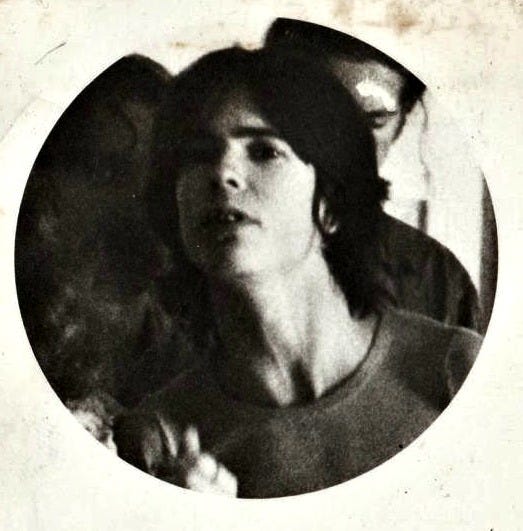
Halcyon Days
London of the 1980s was always bound up with a band of Australians I had known for years.
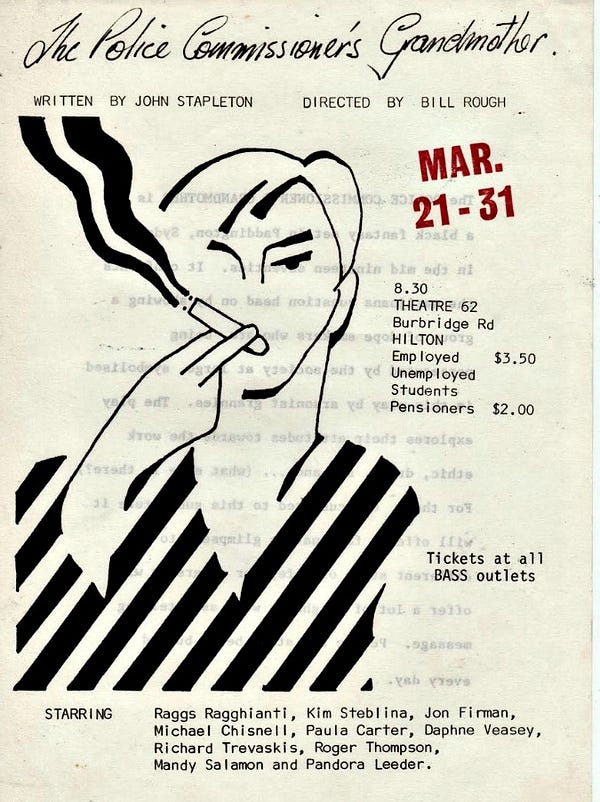
Richard Trevaskis was one of the stars in a play I wrote back in the 1970s called The Police Commissioner’s Grandmother.
The play ran for two weeks in a theatre in Adelaide and received largely positive reviews.
I experienced for the first and last time the pleasure of sitting in a theatre listening to an audience laugh at something I had written.
Theatre Australia declared: “Mr Stapleton makes no bones; he is out to make you laugh and by Christ you will.”
None of the reviewers paid any attention to Trevaskis’s sterling efforts.
But the rest of us did.
We were all a little in love with Richard.
Fast forward
London, although we hadn’t realised it at the time, turned out to be Richard’s high water mark.
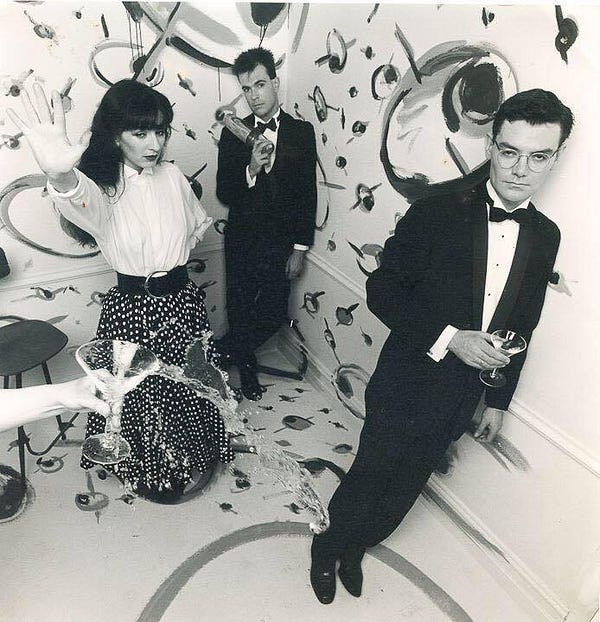
He was the barman par excellence; looked smashing in black and white. Trevaskis had a knack of wrangling jobs in some of London’s trendiest restaurants and nightclubs, including that massive cathedral of hedonism known as Heaven.
Richard was always a loyal friend.
He had a knack of spotting our little gang and swishing us drinks from behind the bar across the six deep queues of customers clamoring for his attention. With the greatest of panache.
There were always privileges to knowing him. Until there weren’t.
Richard didn’t finish work until late; and often drank heavily through until dawn. For a long time he got away with it. Women adored him. Gay men swooned.
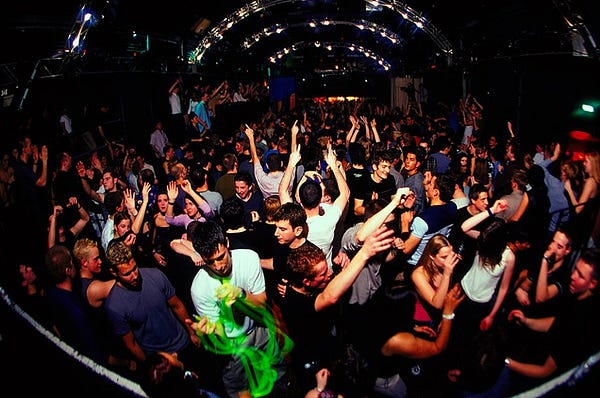
The lethal speed he kept scoring across a particular counter up Kings Road in Chelsea kept us running at a million miles an hour.
Richard was always up at three or four in the morning, perfectly happy to see a visitor.
Late at night the holy rituals led us to states of euphoria no human should endure.
For years after he died I kept expecting Richard to show up in the early hours of the morning with a bottle under his arm; a sunny smile plastered across his ever appealing face, give me a big hug and talk about everything and everybody, just for the fun of it.
How were we to know?
But way back then, in London, Richard had been an aspiring young photographer and the idea of photographing Malcolm McLaren had excited him greatly. He hoped it would be the beginning of a great career.
I was glad of his company.
What was the point of meeting famous people if you couldn’t share the experience with someone afterwards?
We had shown up at McLaren’s offices in Soho and while I did the interview Richard fussed around with all his photographic gear, pretending this was just another routine assignment.
In fact it was the first time he had ever photographed a celebrity.
We were the boys from Australia, hicks from bumfuck nowhere as far as most Londoners were concerned.
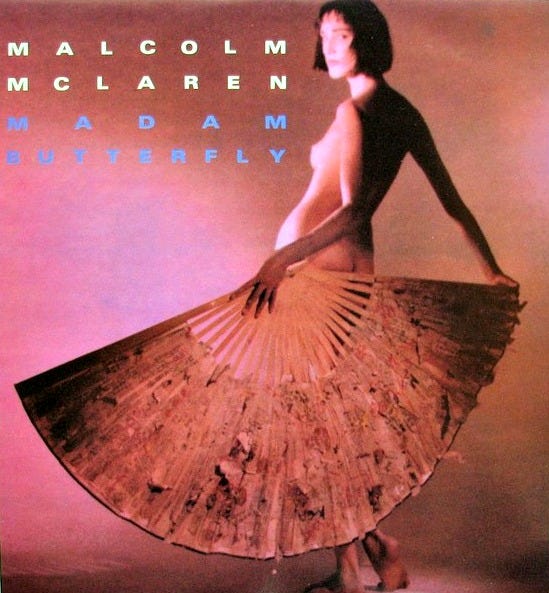
Malcolm McLaren, having more or less invented Punk Rock and the Sex Pistols, was, on the other hand, already stratospherically famous.
Svengali, iconoclast, provocateur, pivotal, the words scrolled out of social and musical commentators worldwide.
Malcolm had recently discovered opera. His single Madam Butterfly, which I played incessantly till no one could bear to hear it anymore, was just about to come out.
Everything seemed to be soaring then; the music, our lives, our loves; the endless adventures of London nights.
I would stumble back home sooner or later; but nothing much stopped some of us going out all night most every night.
Who was to know that this would be our last hurrah?
That Richard’s dreams of being a photographer or even a filmmaker would never amount to a pile of dust.
That these days, this interview, wasn’t a precursor to an ever more fabulous life and successful career, that this was it.
Sold to the Highest Bidder
McLaren was an interview I had already sold to a magazine called Stiletto back in Australia.
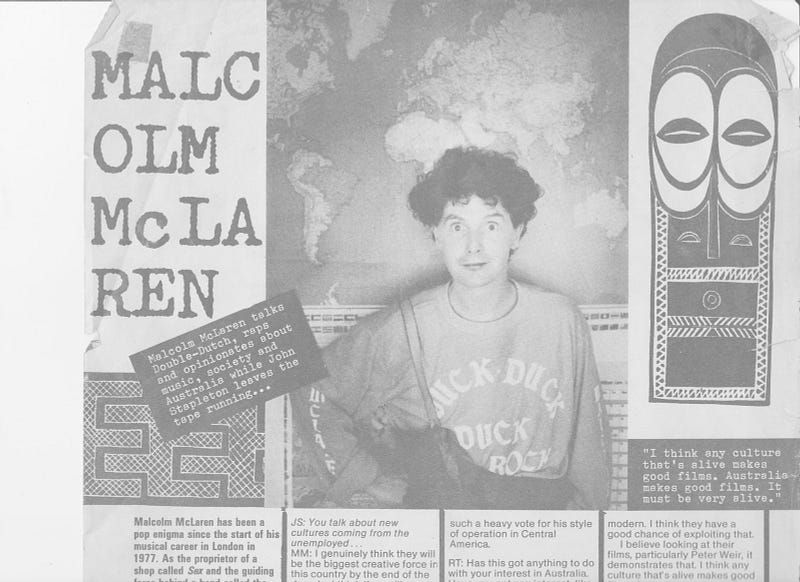
After keeping us waiting for almost an hour McLaren couldn’t have been more charming. It was that rarest of interviews. While not normally a fan of the interview format, I typed up the transcript, changed the order of a few sentences and sent the piece off. It read perfectly.
Richard took photograph after photograph.
I was happy to see his earnest face there. I hated doing these jobs on my own.
During the interview Malcolm disappeared several times into his offices and then re-emerged sniffling slightly, even more articulate than he had been minutes before, expansive on the future of fashion, music, culture, society.
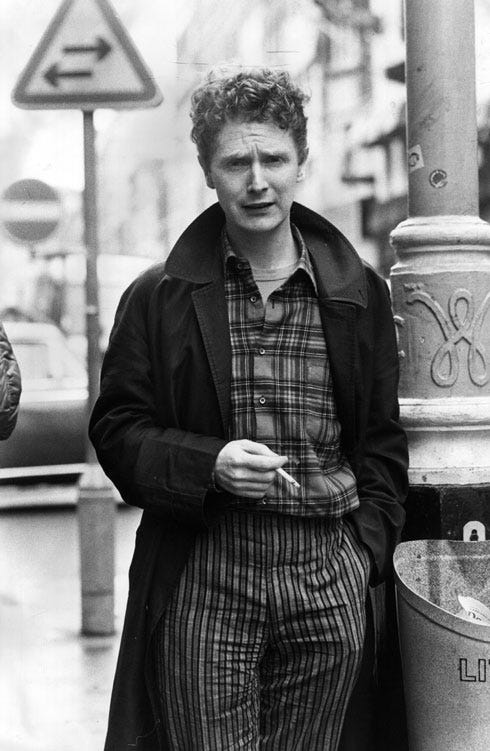
The high quality of the cocaine available in London at the time might have had as much to do with the excellence of the interview as the subject’s natural gifts.
Richard fussed as McLaren expanded on his many themes.
“I genuinely think the unemployed will be the biggest creative force in this country by the end of the decade. I think they will cause great strife in this country politically. No question about it.”
But they don’t have access to marketing, I responded.
“They don’t need it. There’s nothing there for them. That’s what I’m trying to suggest. There is nothing in this country for them.
“New York is a very very happening place. Why? Because the dispossessed there are creating the culture on the streets, in the form of graffiti, in the form of dance music, in the form of turning record players into instruments. That’s happening. They are speaking.
“Rock and roll was the biggest bandwagon that any kid could get on to get outside of the English class structure. It was our way of stepping out. The music was always only ever a means to that end.
“You’re not in the system with CBS trying to dress you up with a skirt or put paint on your face. All you’re doing is saying I’m a wanderer. So I don’t fit. I’m with New Guinea. I’m over here in Mexico. It doesn’t matter. I don’t care that I’m not the manager of Lloyds Bank.”
In later years Richard would always talk about the day he met Malcolm McLaren.
The interview ended on the following note:
Malcolm McLaren: I believe real music comes from ordinary people dancing. Not from record companies.
Richard Trevaskis: One last question, is all this scratching making you rich?
Malcolm McLaren: I hope so.
John Stapleton: All this scribbling ain’t making me rich.
Malcolm McLaren: The life of a writer is a hard one.
And now McLaren is dead.
And Richard is dead — that precocious smile and fine body nothing but ash.
Grow old? Forget it.
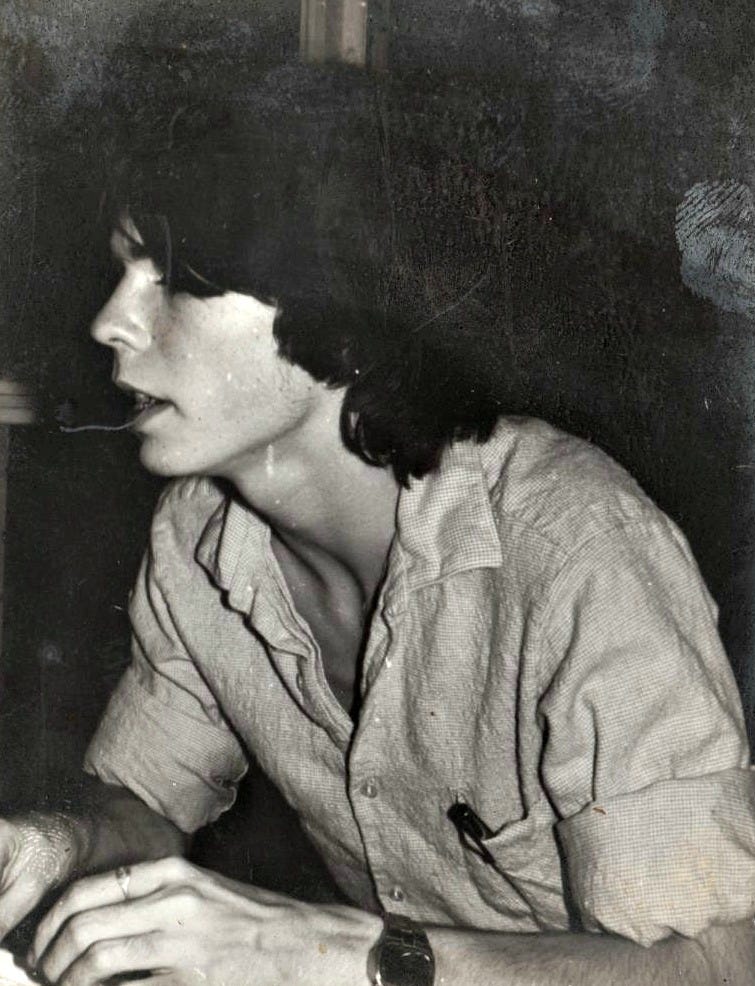
Richard died of a drug overdose in 1997, retreating from London to Sydney and finally to Adelaide, along the way helping to organise some of Sydney and Adelaide’s wildest mega-parties before becoming an incoherent shell in his mother’s giant house. It was the most pointless of deaths.
When the whole of Sydney turned clean and sober overnight and self-help programs became the trendiest thing on God’s Earth, I took Richard to a recovery meeting in the hope he might join the throng — instead of spending his nights in that Elizabeth Bay apartment with the harbor lapping on the sandstone walls outside — when empty bottles of beer and high class booze began to clutter his apartment in an embarrassing way and he became pathetically glad to see any of the old gang.
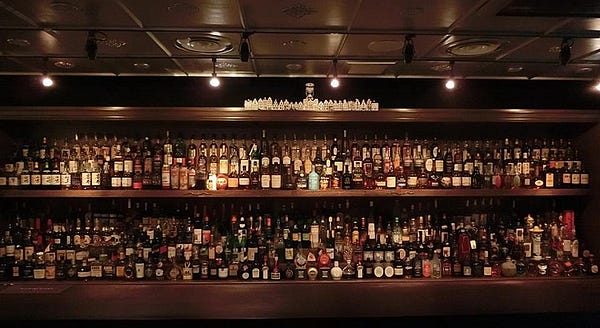
Richard, a walking encyclopedia on cocktails and every form of fancy alcohol known to man, couldn’t think of anything worse than a sober life.
So I took him to a meeting when the slide had already begun, when the good times were in the past and the massive parties which took months of planning and were remembered and discussed for months afterwards were just objects in the litter of the city’s social history.
It was an inner-city meeting I thought Richard might relate to; but far from being inspirational it was just chaotic. An old junky, obviously stoned, droned on for 30, 40, 50 minutes, and nothing Richard heard that evening gave him even so much as a glimmer of an alternative fate line.
Some of Sydney’s meetings were just ridiculous, full of people who didn’t have an addiction problem, they just didn’t fit in anywhere else.
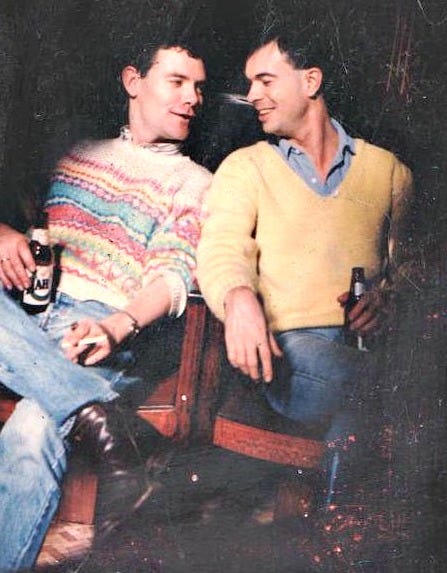
They made up stories of their own dereliction, describing their supposedly terrible rock bottoms by piecing together bits and pieces of other people’s stories.
At least now they felt they belonged somewhere, with a crew as equally dysfunctional and unaccomplished as themselves.
It was a terrible meeting. Even I, filled at the time with the fervour of recovery and the substantiality of a mainstream job, had to admit that.
After the meeting Richard couldn’t wait to get down to the nearest pub, the Lord Roberts in Darlinghurst. Just couldn’t wait.
As I watched, he drank furiously, anything to wipe that dreadful meeting out of his mind.
Richard drank that night and every other night; and was determined not to stop. That dismal meeting, that one attempt at rehabilitation in the soggy streets of Darlinghurst in inner-Sydney, became just another pitstop on the highway of no return.
And Then Came the News
Richard retreated to his old bedroom in his mother’s giant house in North Adelaide 1400 kilometers away. For the last year of his life I heard stories; and wanted to go and visit.
I had a job as a pooh bah journalist on one of the country’s major newspapers, we had our memories of wild wild times.
We occasionally spoke on the phone.
Friends muttered regret or concern at what had happened to him.
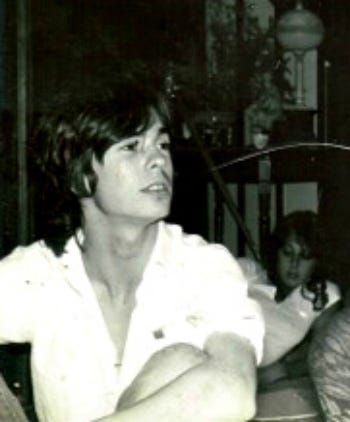
Even in his final days Richard would have been interested in the news that Malcolm McLaren was dead.
And then came the news.
Richard had died, 8th of May, 1997.
He was just out of his twenties.
The saddest times, deliberately askew, couldn’t beat the adventures that we had; but now they were just sad little dollops of memory down through the gloom, everything tainted with nostalgia.
Old friends, busy with their momentous new lives, gathered for a messy, ramshackle memorial in Sydney.
There wouldn’t be any visits south.
Revolutionary Intent: Cash From Chaos
Three years later, Malcolm McLaren also passed away; in a Swiss Clinic, his passing making news around the world.
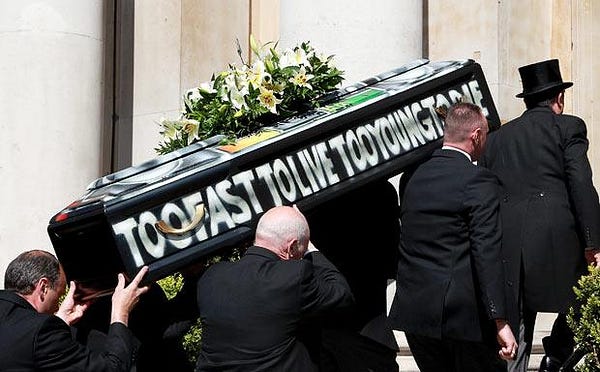
Under the headline “Anarchy rules as Malcolm McLaren funeral draws punk glitterati” The Guardian newspaper recorded:
Malcolm McLaren’s funeral was never going to be a sober affair.
As the hearse bearing the punk impresario’s coffin passed shops selling bondage gear and Sex Pistols T-shirts in north London today, some clapped, most cheered, and one voice which cried “Anarchy!” rose above the rest.
A horse-drawn carriage headed the procession from the deconsecrated St Mary Magdalene church to Highgate cemetery, while McLaren’s coffin was spray-painted with the words “Too fast to live, too young to die”.
It was followed by an overflowing green double-decker bus destined for “Nowhere” and decorated with one of McLaren’s favourite sayings: “Cash from chaos.”
McLaren’s final wish was to be buried, wearing a new suit, in Highgate Cemetery north London, close to where he grew up.
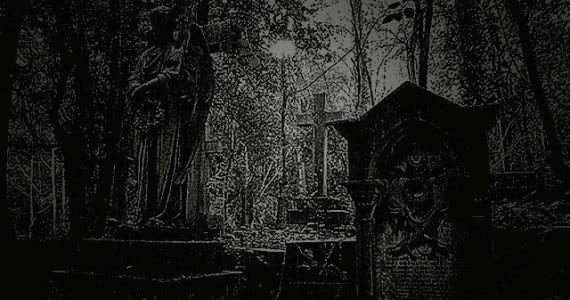
The cemetery, known as the spookiest in London and often claimed to be haunted, is famous as the final resting place of Karl Marx.
Son with fashion supremo, longtime friend and partner Vivienne Westwood, Joe Corre told The Guardian newspaper:
“He has an affinity with that place. I have spoken to them and they have some room, fortunately.
“My father was a very special person — a person who changed the world.
“I am incredibly proud of him. He was an old warrior. The world would have been a very different place without him. He produced nothing short of a revolution.”
No such claims will ever be made for Richard Trevaskis.
But some of us who survived miss him still.
From the upcoming memoir Hunting the Famous.
John Stapleton worked as a journalist on The Sydney Morning Herald and The Australian for more than 20 years. A collection of his journalism is being constructed here.
